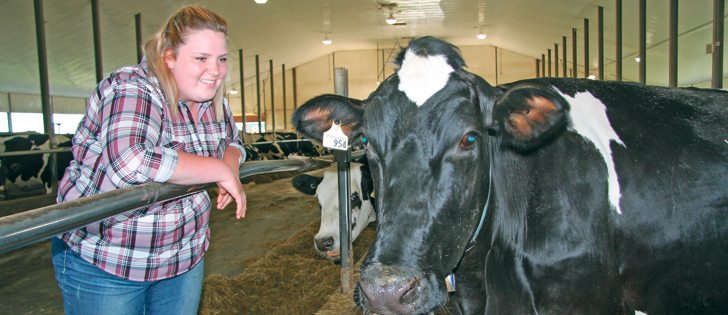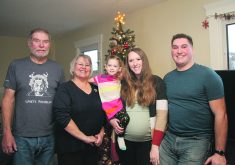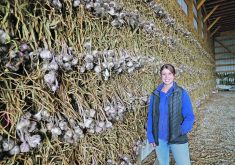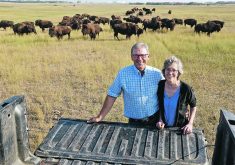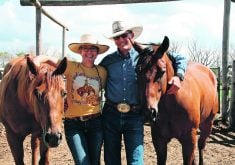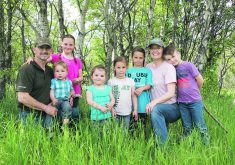GOULDS, N.L. — There was never a doubt that Rebecca Williams would be the fourth generation to operate Forest Pond Farms Ltd.
The dairy barn is her happy place.
“I love it,” she said. “That’s simply it. I’ve never wanted to do anything else.”
At 20 years old, she has a two-year dairy business management diploma from Nova Scotia Agriculture College under her belt and was contemplating a return for two more years to obtain an agri-business degree. She decided her heart was at home in Newfoundland and Labrador with the herd.
Read Also

Nutritious pork packed with vitamins, essential minerals
Recipes for pork
“I’m ready to be home,” she said. “For good.”
Her dad, Ray, is currently in charge, and they have no formal succession plan in place, but Rebecca says she is ready to take over. Darlene, her mother, says when Rebecca came home from Nova Scotia on school breaks, she ran the show.
“I’m OK with working every day,” Rebecca said. “I enjoy getting up and working all day long.”
The family milks 170 cows at 5:30 a.m. and 4 p.m. each day, and has a about 200 head. The cows are housed in a free stall barn with a parallel milking parlour.
They operate in conjunction with Pond View Farm next door to share some equipment and facilities.
Milk is picked up every second day by Central Dairies, an AgroPur company, and shipped to the mainland for further processing. Only fluid milk, some cheese and butter are processed on the island.
Transportation is a challenge for the island’s 27 dairies.
There is no auction or feedlot, so cull cows are shipped by truck and ferried off the island.
“We keep a lot of bulls for our own use for beef,” Rebecca said. “We sell some to hobby farmers.”
The Williams family makes silage bales and mixed ration of feed daily but much of the feed is imported from the mainland because of the short growing season and lack of land available to grow it.
“It takes 12 hours to come across the island from Port-aux-Basques,” said Darlene, referring to where the ferry unloads on the other side of the island.
Rebecca said other cost-of-production challenges are the weather and labour.
“People don’t want to do a heavy labour job,” she said. “Getting someone new is hard.”
Rebecca has shown cattle at events around the province since she was four years old. She be-lieves that connection developed with cattle in the show ring played a big role in shaping her career choice.
“There’s just the rush of being in the ring,” she said. “
But there’s also extra responsibility and work ethic you get from doing that.”
Rebecca is involved in the Newfoundland and Labrador Young Farmers’ Forum and said it’s important for the next generation of farmers to educate themselves, implement new methods and technologies and tell their stories.
As part of that, she began doing tours on the farm that attracted 500 children over the last three years.
She and her sister work with the School Milk Foundation of Newfoundland and Labrador and Agriculture in the Classroom to conduct the tours, which she describes as eye opening for both students and teachers.
On three different tours, the attendees even got to see a calf being born, and Rebecca said she was surprised that parents and teachers on the tour didn’t all know a cow had to have a calf to produce milk.
“Maybe 50 out of those 500 kids will work in ag some day,” she mused. “As young as they are, they now know they need agriculture every day.”
Because of Newfoundland’s geography, farms are often close to residential areas. Rebecca said there are sometimes complaints when manure is spread or when tractors take up too much space on narrow roads but she is unapologetic.
“We’re feeding your family,” she said. “We were doing our work before you got out of bed.”
She and her parents have work to do to transition the operation so she can continue that mission of feeding other families. She is eager to introduce new practices and technology she learned at school.
“It’s a tension thing that we face every day,” she admitted, but said her family isn’t different from other farm families in that respect.
According to Statistics Canada, only 5.7 percent of the province’s farms have written succession plans.
Rebecca is also concerned that the number of dairy farms is dropping. In 2002, there were 41.
“I worry that small farmers that have such passion aren’t going to make it as the industry grows..”




